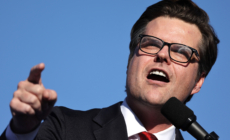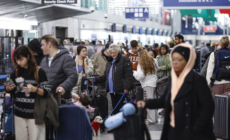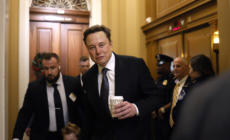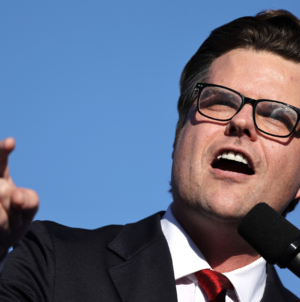-
Matt Gaetz Ethics Committee Report: What to Expect in Monday’s Release - 6 mins ago
-
Visitors to Riverside’s Festival of Lights warned of parking scam - 22 mins ago
-
Letter Calling for Tracking People of Color Circulates in an Oregon County - 37 mins ago
-
Eagles’ Jalen Hurts Officially Ruled Out With Concussion - 41 mins ago
-
Possible rain, high surf forecast for Los Angeles area in holiday week - about 1 hour ago
-
Tiger Woods Son Charlie Hits Epic Hole in One While Playing Alongside Father - about 1 hour ago
-
Trump Picks a Former Treasury Official as His Top Economist - about 1 hour ago
-
Winter Weather: ‘Trouble Spots’ Across US as Millions Travel for Christmas - 2 hours ago
-
Woman Dies After Being Set on Fire in Subway Car, Police Say - 2 hours ago
-
Republican Says Elon Musk Feels Like ‘Our Prime Minister’ - 2 hours ago
Supreme Court to Hear Trump’s Immunity Claim, With Arguments Set for April
The Supreme Court on Wednesday agreed to decide whether former President Donald J. Trump is immune from prosecution on charges of plotting to overturn the 2020 election.
The justices scheduled arguments for the week of April 22 and said proceedings in the trial court would remain frozen while they considered the matter.
The court’s brief order said the court will decide this question: “Whether and if so to what extent does a former president enjoy presidential immunity from criminal prosecution for conduct alleged to involve official acts during his tenure in office.”
The Supreme Court’s response to Mr. Trump’s bid for delay had taken on increasing urgency because its ultimate resolution would determine whether and how quickly Mr. Trump could go to trial. That, in turn, could affect his election prospects and, should he be re-elected, his ability to scuttle the prosecution.
In an emergency application asking the Supreme Court to intervene, Mr. Trump said a unanimous three-judge panel of the U.S. Court of Appeals for the District of Columbia Circuit had been wrong to rule that he may be criminally charged for his conduct as president. Total immunity for his official conduct, Mr. Trump’s application said, is required by the separation of powers, implicit in procedures for impeaching the president and needed to prevent partisan misuse of the criminal justice system.
“An absence of criminal immunity for official acts threatens the very ability of the president to function properly,” the filing said. “Any decision by the president on a politically controversial question would face the threat of indictment by the opposing party after a change in administrations.”
Mr. Trump, widely considered the Republican front-runner, added a practical concern.
“Conducting a monthslong criminal trial of President Trump at the height of election season will radically disrupt President Trump’s ability to campaign against President Biden — which appears to be the whole point of the special counsel’s persistent demands for expedition,” the application said. “The D.C. Circuit’s order thus threatens immediate irreparable injury to the First Amendment interests of President Trump and tens of millions of American voters, who are entitled to hear President Trump’s campaign message as they decide how to cast their ballots in November.”
Jack Smith, the special counsel overseeing the federal prosecutions of Mr. Trump, took issue with every element of his argument, citing his efforts to subvert democracy.
If Mr. Trump’s “radical claim were accepted,” Mr. Smith wrote, “it would upend understandings about presidential accountability that have prevailed throughout history while undermining democracy and the rule of law — particularly where, as here, a former president is alleged to have committed crimes to remain in office despite losing an election, thereby seeking to subvert constitutional procedures for transferring power and to disenfranchise millions of voters.”
Mr. Smith added that there was no reason to fear tit-for-tat prosecutions that would chill other presidents from taking decisive action.
“That dystopian vision runs contrary to the checks and balances built into our institutions and the framework of the Constitution,” Mr. Smith wrote.
In a supporting brief urging the justices to deny Mr. Trump’s request for a stay, several former prominent officials who had served in Republican administrations said the court need not rule broadly, as the conduct Mr. Trump is accused of was so clearly outside of any immunity the Constitution might confer.
“Denying a stay would not preclude possible federal criminal immunity for a president’s official acts in some different, exceptional situation,” the brief said.
Mr. Smith echoed the point, citing the officials’ brief. “A sufficient basis for resolving this case would be that, whatever the rule in other contexts not presented here,” he wrote, “no immunity attaches to a president’s commission of federal crimes to subvert the electoral process.”





















